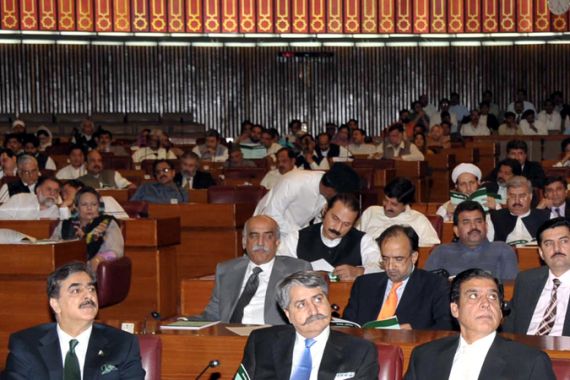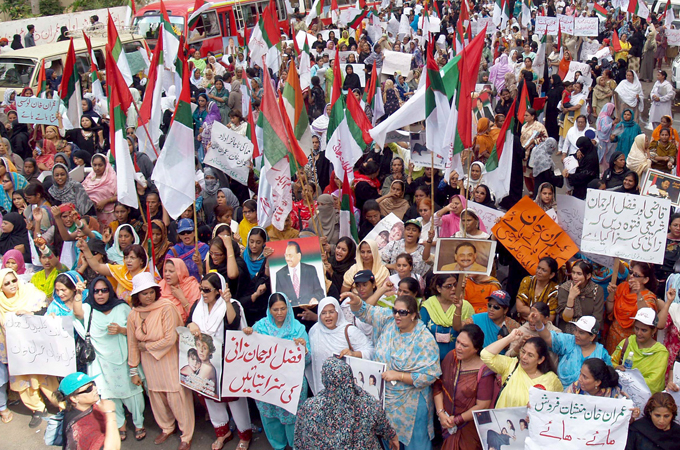Pakistan coalition partner quits
Prime minister insists MQM’s withdrawal will not cause the collapse of the PPP-led federal government.

 |
| The MQM, which main support base is located in the city of Karachi, will now sit on the opposition benches [File: EPA] |
Pakistan’s Muttahida Qaumi Movement has announced that it has withdrawn from the coalition government and will now sit on the opposition benches in the National Assembly.
The party’s decision has raised concerns about the PPP-led government’s stability, even though Yousuf Raza Gilani, Pakistan’s prime minister, insists that his government will not collapse.
The Muttahida Qaumi Movement, also known as the MQM, was the second largest party in the governing coalition.
“It has been decided,” Wasay Jalil, a spokesman for the MQM, said on Sunday. “We will sit on the opposition benches in the National Assembly and the senate.”
The MQM’s move comes just days after two of its ministers quit the federal cabinet, in protest against the government’s plans to impose a new “reformed general sales tax”.
Asif Ali Zardari, Pakistan’s president and the co-chairperson of the PPP (Pakistan People’s Party), recently visited Karachi, the MQM’s main support base, to hold emergency talks with the party’s leaders, but no agreement was reached.
Unequal taxation
Speaking to Al Jazeera on Sunday, Haider Abbas Rizvi, MQM’s deputy parliamentary leader, cited government corruption, rising prices and a regressive tax policy as the factors behind the party’s decision.
“The poor and middle class people are being taxed by the government, but the rich and the feudals are never being taxed,” Rizvi said.
An MQM statement said the tipping point was the government’s decision to raise the prices of petroleum products on January 1.
“Right at the start of the new year the government has raised the prices of petrol and kerosene oil which is unbearable for the people who are already under pressure from the already high prices,” the MQM said.
Rizvi asserted that his party was not seeking to destabilise or overthrow the government.
“Our idea is certainly not to support the government, but we do not want to become a part of derailing the existing political system in Pakistan. We would … support, while sitting in the opposition, all the good ideas of the government in parliament,” he said.
“We have no intention whatsoever to derail the government.”
The departure of the MQM from the ruling coalition leaves the PPP in a minority government, facing a possible midterm vote if the opposition unites to pass a no-confidence motion in parliament.
Political scenarios
Al Jazeera’s Kamal Hyder, reporting from Islamabad, said a no-trust motion is not likely to materialise because the opposition PML-N – the second largest party in the parliament – is loathe to side with the MQM.
The PML-N is led by Nawaz Sharif, a former prime minister.
“The PML-N is siding with the PPP [on the MQM issue], particularly the prime minister, even though openly there is a war of words going between the two,” our correspondent said.
“Recently, the PML-N got into a verbal fight with the MQM, with all kinds of allegations being levelled against each other. So, that … may have prompted the government to rely on the PML-N and to lose its key ally, the MQM.”
Discussing the timing of the MQM withdrawal, Al Jazeera’s Hyder said public sentiment is very much opposed to the PPP and its government.
“The MQM is also trying to capitalise on the public sentiment at large who are very much against the new plan by the PPP to impose the General Sales Tax (known as the RGST), a tax that was going to be imposed because of Pakistan’s commitments to the IMF,” he said.
“The Americans has also said that unless there was a broader tax base, unless the rich were taxed, the US would not give aid to Pakistan.”
In its response to Sunday’s development, the PML-N said through its spokesman, Ahsan Iqbal, “it is the PPP’s moral duty now to prove their majority in the National Assembly. The prime minister should take a fresh vote of confidence from the parliament”.
Without the MQM’s 25 seats, the PPP’s coalition numbers 160 seats in the 342-member National Assembly, 12 short of the 172 required for a majority.